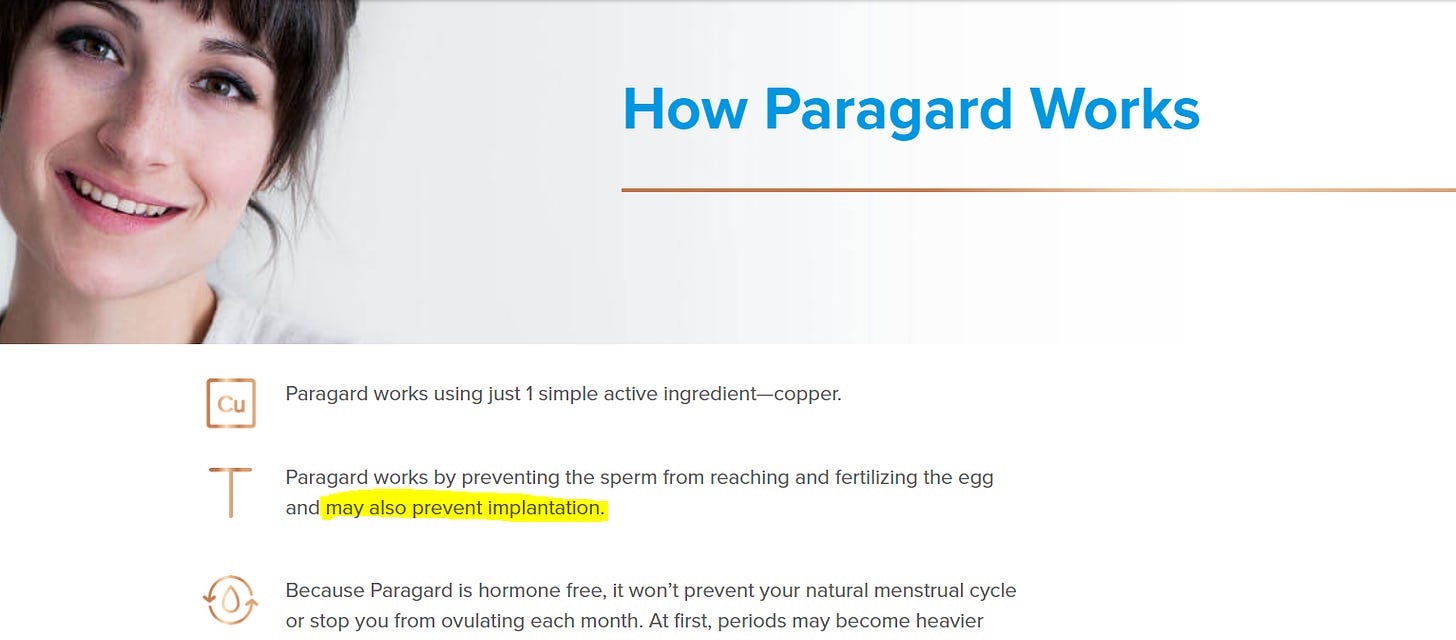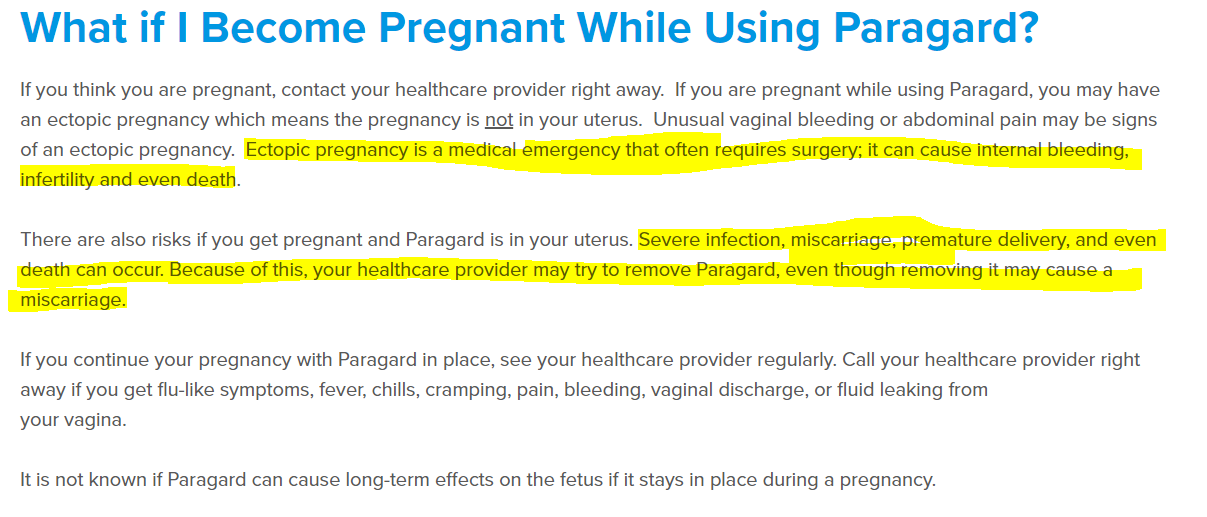“Absolutely no hormones, and we don’t have to worry about pregnancy for another 10 years!” I came in late to a conversation in which a fellow theology master’s student was extolling the benefits of her newly-placed copper IUD. Alarm bells rang in my head. Don’t IUDs prevent implantation? I thought to myself. In the next breath she laid that concern to rest, reassuring us all that her doctor had been clear: IUDs are not abortifacient.
I didn’t question her at the time, assuming I had somehow been mistaken. After all, she was an intelligent, passionately prolife woman pursuing a master’s degree. Surely she had done her homework.
Playing Word Games with Women’s Health
This story came back to me as I was researching my upcoming book, Reclaiming Motherhood from a Culture Gone Mad. Chapter Four provides an in-depth look at the devastating effects of contraceptives on women’s health, societal status, and marriages. In reviewing the research, I was disturbed anew. Not only was I right about IUD’s “preventing” pregnancy through early automatic abortion, this is an integral mechanism of all hormonal contraceptives as well.
Unfortunately, this kind of miscommunication between women and their doctors is all-too-common. The use of IUDs is on the rise as women wake up to the negative effects of hormonal contraceptives on their mental and physical health.
Why are women being told by their doctors that this isn’t the case? Why are doctors lying to their patients?
Pregnancy Redefined
Lying is probably an overstatement. It indicates an intentional withholding of the truth which likely isn’t the case here. The miscommunication between women and their doctors stems from the redefinition of pregnancy by the American College of Obstetricians and Gynecologists (ACOG) in 1965. Prior to then, “conception” was defined as beginning at fertilization. The changes shifted the definition forward a few days, redefining conception as “a process” rather than a moment, beginning with fertilization and ending with implantation. According to the new definition, pregnancy does not begin until the “process” is complete, and so pregnancy cannot be said to begin prior to implantation. The implication of this shifting definition is to eliminate the possibility of an abortion taking place prior to implantation; there can be no abortion if there is no pregnancy.
This difference in understanding is the reason some refer to pills taken after sex to prevent implantation as “emergency contraception” while others term it the “abortion pill.”
Currently, the medical establishment uses this definition of pregnancy as a phenomenon that begins not at fertilization, but implantation. This is even the language used in pro-life federal Hyde Amendment, which prohibits the use of federal funding for abortion but permits its use for "drugs or devices to prevent implantation of the fertilized ovum." This language discrepancy is the reason publications like The New York Times insist on “debunking” the claim that contraceptives are abortifacient.
When pharmaceutical companies and doctors define pregnancy in this way, they aren’t lying to women when they say the products they peddle aren’t abortifacients. But if the women to whom they are speaking believe that life begins at conception, and define deliberate termination of that life as abortion, can we say these professionals are truly being honest? If a patient is seeking information about a treatment, don’t physicians have an obligation to communicate in language that the patient understands? Is double-speak of this kind really compatible with the notion of “informed consent”?
Mechanisms of Contraceptives
Barrier methods such as diaphragms, condoms, and even spermicides work solely to prevent conception. When they fail, conception occurs and, because they have not actively worked to undermine the uterine environment, there is no artificially-created barrier to implantation that causes early miscarriage.
The same cannot be said for the various iterations of “the pill,” “the patch,” “the ring,” the monthly injection Depo Provera, or IUDs hormonal and nonhormonal. For example, Paragard is a hormone-free IUD made from copper which is toxic to sperm and eggs. It also prevents implantation, as disclosed on their website:
Paragard also warns patients that this “treatment” may result in unintended pregnancies that can cause infertility or end in miscarriage:
They also warn about its potential to cause other infections with life-threatening potential:
As well as emergencies and harm to babies when women become pregnant anyway.
The sad reality is that IUDs and hormonal contraceptives all function this way: with serious risks to health of mom and baby (if conceived).
Rather than preventing conception, virtually every form of hormonal contraception “prevents pregnancy” by creating conditions within a woman’s body that cause early miscarriage.
Can we call this abortion? After all, the pill or shot was taken prior to conception, and the conceived life ends without the mother’s awareness. Pregnancy cannot even be detected until after implantation.
Sadly, the answer is yes. Intentionally or not, these medications function not only by preventing conception, but by ensuring that conceived life cannot continue. It is a “fail-safe,” a kind of pre-abortion ensuring that if conception happens, the mother doesn’t even know about it.
Except, of course, in the cases when it happens anyway. There are so many stories of women conceiving despite their use of contraceptives that they are hardly news (and in fact are among the reasons for the vitriol in the current abortion battle, arrows in the quiver of advocates who argue that abortion is necessary for exactly these cases in which contraception fails).
When IUDs fail, the stakes are much higher. As pictured in the disclosures above, unintended pregnancy with an IUD in place can result in infection, infertility, miscarriage, premature delivery and death.

Implications for Prolife Women
For women who understand that life begins at conception, that their motherhood begins at conception, the fact that the “most effective” contraceptive methods on the market achieve their success in part through causing early termination of their conceived children has serious implications. Many are aware of this and so avoid these methods of contraception. But many, like my classmate, do not understand the way in which their chosen method of contraception functions. Many would be horrified to find out.
After all, contrary to the medical definition in the books, even state legislation often reflects the understanding that pregnancy begins at conception. Of the 22 states that have moral laws regarding pregnancy, 18 of them use this definition. Is it any wonder that women don’t scrutinize the ways in which their doctors define pregnancy carefully enough to uncover this discrepancy in language?
And what about the battle we see currently playing out in headlines over the potential overturn of Roe v. Wade? While many scoff at those on the pro-abortion front who warn about the pro-life movement “coming after” contraception next, isn’t that exactly the implication of the pro-life position for these abortifacient forms of birth control? Make no mistake, if life begins at conception, these forms of contraception are abortifacient. Regardless of any word games we want to play with pregnancy, these forms of contraception prematurely end the lives that began at conception.
This information is tricky. It is easier to live in ignorance. But once we see the truth, we cannot unsee it. The question now is: what do we do about it?
What Are the Alternatives?
Trusting that the medical industry will act in our best interest is naïve (and not always because of intentional conspiracy or cover up). What drives industries is profit, and even with the best of intentions, if there is no money behind understanding certain interventions, the information won’t become available.
For women using contraceptives to mask medical conditions, you don’t need to resort to these medications and put up with their side effects any longer. You can find a doctor who is willing to work with you and has actually received training to address the root causes of your symptoms.
For my Protestant sisters (and Catholics as well) who do not share Catholic convictions regarding the moral problems with contraceptives, I suggest two things. First, while barrier methods are not abortifacient for the reasons I explained earlier, I urge you to investigate the claims surrounding contraception for yourself. The ways these practices affect us are not negligible, from health concerns to the societal implications predicted in Humanae Vitae to our own attitudes towards our children.
Whatever their situation or background, I urge women to try natural family planning (NFP). As Fulton Sheen reminds us, “If you do not live what you believe, you will end up believing what you live.” If you haven’t already, try it. See if living in a way that is more compatible with God’s plan for your natural fertility doesn’t free you in unexpected ways. If you need more encouragement, listen to the stories of women and couples who have, like former Protestants Scott and Kimberly Hahn, or former atheist Jennifer Fulwiler who testify to this exact experience.
Where Do We Go From Here?
Share this information. Share this article. Women and medical professionals deserve to know the truth about this industry. Chat with your friends, sisters, and daughters. Explain it to your OB. Ask your OB to get NaPro training. Petition your Catholic hospital to employ OBs, nurses, and other physicians who are NaPro trained. Sign the petitions by Natural Womanhood asking the CDC to correct misleading information about the effectiveness of fertility-Awareness based methods (FABMs) and arguing for the FDA’s full disclosure of the health risks of hormonal contraceptives.
Got other ideas? Leave a comment and share them with this community!
Books: Mama Prays | Reclaiming Motherhood from a Culture Gone Mad
Connect: Instagram | Facebook | Twitter
Podcasts: Brave New Us | Mama Prays
Website: www.SNStephenson.com









This article should also mention Norplant.
So what birth control is safe to take?